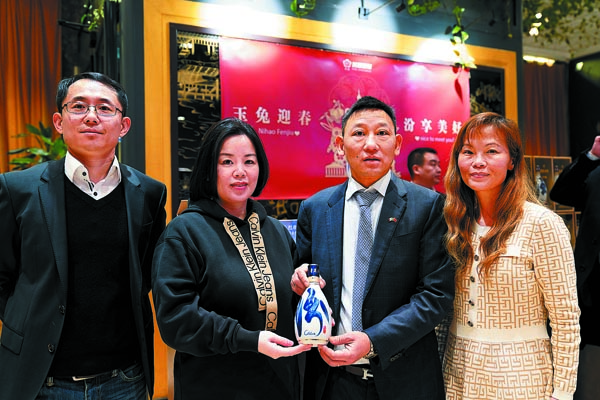Nations celebrate historical liquor brand


Guests celebrated the historical connection between Chinese liquor and Italy at a recent reception held in Milan by the Qingtian chamber of commerce to ring in the Chinese Lunar New Year.
Qingtian, a county in East China's Zhejiang province, is the hometown of 381,000 overseas Chinese, who have settled across 146 countries and regions, according to figures released by the East China Normal University in December. More than 100,000 Qingtian natives live in Italy.
Chinese and Italian officials, representatives of organizations for Chinese living in Italy and members of the Qingtian chamber of commerce in Italy were among the more than 500 guests who attended the reception.
A representative of Xinghuacun Fenjiu, a time-honored distiller based in North China's Shanxi province, shared with guests the historical connection between fenjiu, or traditional liquor made in Shanxi, and Italy. The story traces back to the Yuan Dynasty (1271-1368) and the famed Italian explorer Marco Polo.
At the age of 17, Polo embarked on a journey to China with his father and uncle, arriving in Beijing -then called Dadu — in 1275. He recorded his experiences in his celebrated book, Travels of Marco Polo.
The book contains descriptions of lujiu — medicinal liquors mixed with edible animal and plant materials — such as zhuyeqing, and wine from Taiyuan, which is now the capital city of Shanxi province.
Wine made in Taiyuan had been made in tribute to the imperial court. Many people in the city made a living by operating vineyards. Today, the suburbs of Taiyuan and the nearby Taigu district and Qingxu county remain key regions for grape production.
The techniques for brewing liquor varieties including zhuyeqing, which literally means bamboo-leaf green, were brought to Italy via Polo. The medicinal liquor quickly gained traction among Italians for being appetizing, healthy and helpful to improved digestion.
Today, in some food stores or health products stores in Rome, Paris and San Francisco, one can easily spot healthy liquors made from bamboo leaves.
Herb-based health products made in natural food markets and restaurants in the US city of Fort Lauderdale sell well. This herbal powder or liquid is put into baijiu, a type of Chinese alcohol, or fruit juice. It is believed that these herb-infused drinks can provide human cells with nutrients and increase vitality. For this reason, these drinks have come to be known as "smart foods".
With the efforts of Xinghuacun Fenjiu, fenjiu liquor and its history and culture have been gaining recognition around the world, according to a representative of the company. Since 2020, Xinghuacun Fenjiu created the cultural brand of "If our language is fenjiu". It is aimed at combining fenjiu's history and culture with the pursuit of a better life. It also highlights fenjiu's uniqueness as well as what it shares with other liquors from around the globe.
Zhao Qingyuan contributed to this story.




































